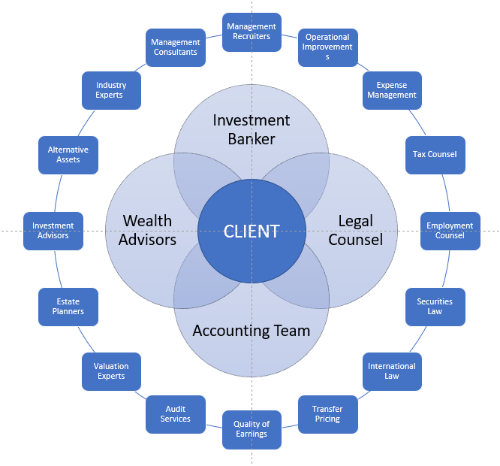CMG Insights in Sixty Seconds: Building Your M&A Advisory Team: Legal Counsel (Part 1 of 4)
If you are going to sell your business only once, do it right the first time! Owners cannot do it alone, so it is essential to assemble a collaborative team of M&A experts to guide you and your company through the lengthy and complex process of selling your business.
M&A Experts: The Core Four
There are four experts that are essential to creating the best possible outcome in any M&A transaction, collectively, “The Core Four”:
- Legal counsel
- Accounting team
- Private wealth advisors
- Sell-side investment bank
With any of these advisors, we highly recommend hiring experienced M&A transaction specialists that can help address and manage the many complexities of a transaction. While dentists and brain surgeons are both medical doctors with years of education, multiple advanced degrees, and extensive experience in their respective fields, we would never recommend using a dentist for brain surgery or vice versa. Hire the right experts!
Hiring the experts is not an expense; it is an investment in your success. The process starts with collaborative planning and preparation, moves though a disciplined process progression and concludes with a successful closing that exceeds the expectations of the seller. The right team can deliver much more value every step of the way via an increase in purchase price, more seller friendly terms and conditions, smaller tax bill, and/or protection from post closing issues. Over this series of CMG Insights, we will explore the primary roles of each of the Core Four and the value that they bring to your engagement.

Legal Counsel For Your M&A Transaction
Simplistically stated, the lawyer’s primary responsibility is to ensure the legal agreements accurately reflect the seller’s intentions and to protect the seller’s interests and rights after the closing of the transaction. Each M&A transaction has dozens of legal agreements that govern the sale, involving hundreds of pages of highly specific language that need to be fully scrutinized and negotiated in order to close. These include the purchase and sale agreement, financing documents, operating agreements, equity participation agreements, employment contracts, escrow agreements, real estate leases just to name a few, not to mention all their ancillary documents. If there is ever a dispute, a few choice words in any one of these agreements may affect millions of dollars in value.
Transaction counsel plays a key role in managing the due diligence and information disclosure process by reviewing and analyzing the company’s operating policies, compliance issues, vendor and customer contracts, intellectual property protections, governmental filings (federal, state and local), potential litigation issues, and other key areas of concern. Through this detailed legal due diligence review, counsel can also proactively help the seller address any potential problems before the closing, reducing the risk of post-closing liabilities.
Legal advisors will also rely on their own set of subject matter experts, depending on the needs of the client. Tax structuring, international regulations, licensing and permitting compliance, employment issues, securities regulations, etc., will all need to be addressed. Your legal team should have access (either in-house or through their networks) to these highly specific areas of expertise. While most business owners use lawyers in the day-to-day operations of the business (contract lawyers, employment lawyers, litigators, IP counsel, etc.), the value of expert transaction legal counsel cannot be overstated.
Building Your M&A Advisory Team
One of the best ways to build your M&A Core Four team is to solicit references from your existing trusted advisors. Every M&A professional has a small group of trusted experts with whom they regularly collaborate and can help you maximize the outcome of your ‘once in a lifetime’ opportunity. We have found that upon receiving a reference, the next step is often flawed as very few owners have ever “interviewed” a lawyer. Email us to get our recommended questions for interviewing a M&A lawyer at info@cartermorse.com We would be happy to make tailored recommendations for your specific circumstance.

